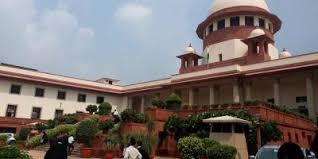Meanwhile, for one reason or another, the proceedings before the executing court were delayed and then the respondents/judgment debtors moved an application before the “executing court” on 19.01.2017 challenging the order dated 12.02.2013 by which the court had allowed the execution of the decree. This as we can see was done nearly four years after the order dated 12.02.2013. (Para 3)
The order dated 28.09.2017 was challenged by the respondents in revision, where it was set aside by an order dated 22.12.2017. The landlord’s writ petition before the Bombay High Court against the above order was dismissed vide the impugned order dated 08.01.2021, and this is how the decree holder is now before us. (Para 3)
A bare perusal of the aforesaid provision shows that all questions between the parties can be decided by the executing court. But the important aspect to remember is that these questions are limited to the “execution of the decree”. The executing court can never go behind the decree. Under Section 47, CPC the executing court cannot examine the validity of the order of the court which had allowed the execution of the decree in 2013, unless the court’s order is itself without jurisdiction. More importantly this order (the order dated 12.02.2013), was never challenged by the tenants/judgment debtors before any forum. (Para 5)
The reality is that pure civil matters take a long time to be decided, and regretfully it does not end with a decision, as execution of a decree is an entirely new phase in the long life of a civil litigation. The inordinate delay, which is universally caused throughout India in the execution of a decree, has been a cause of concern with this Court for several years. (Para 6)
According to the appellant / landlord, the tenants committed a default which led to the filing of the application under Order XXI Rule 11, CPC for execution of the decree. The executing court vide its order dated 12.02.2013 held that the decree is liable to be executed. This order was admittedly never challenged in appeal by the judgement debtor and has attained finality. (Para 7)
On 19.01.2017, i.e., nearly four years later, the judgement debtors moved an application before the executing court to set aside the order dated 12.02.2013, reiterating their previous stand that the tenants had never committed any default in payment of rent. Objection to the very maintainability of such an application was raised by the decree holder, inter alia on the grounds that the order dated 12.02.2013 has attained finality and cannot be reopened. The executing court, to our mind, took the correct decision in allowing the objections of the decree holder and dismissing the application filed by the judgement debtors on the ground of maintainability. (Para 7)
The logic here is that an execution proceeding works in different stages and if the judgment debtors have failed to take an objection and have allowed the preliminary stage to come to an end and the matter has moved to the next stage, the judgment debtors cannot raise the objection subsequently, and revert back to an earlier stage of the proceeding. This is exactly one of the reasons given by the executing court in its order dated 28.09.2017 which we have already referred above. Merely, because it has not specifically referred to the principle of res judicata will not make any difference (Para 7)
The High Court, to our mind, committed an error by not interfering in the matter. To our mind this case has unnecessarily been dragging on for so long; which is for nearly two decades. (Para 8)
The executing court is hereby directed to proceed with and complete the execution as expeditiously as possible, but at any event within a period of six months from the date a copy of this order is placed before the court. (Para 8)
SUPREME COURT OF INDIA
2023 STPL(Web) 393 SC
[2023 INSC 958]
Pradeep Mehra Vs. Harijivan J. Jethwa (Since Deceased Thr. Lrs.) & Ors
Civil Appeal No. 6375 Of 2023 (Arising Out Of Slp (C) No.8943 Of 2021)-Decided on 30-10-2023.
https://stpllaw.in/wp-content/uploads/2023/10/2023-STPLWeb-393-SC.pdf







